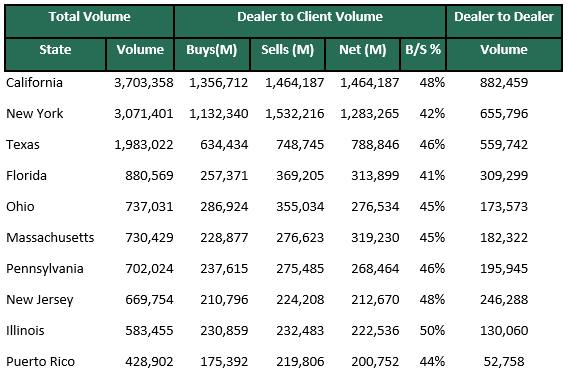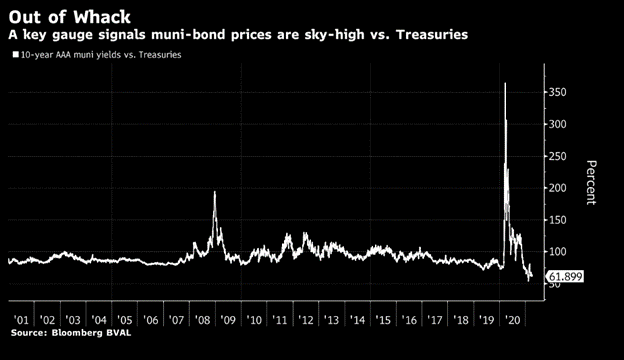Weekly Muni Snapshot | April 12, 2021

|
Municipal New Issuance: The negotiated new issue calendar totaled approximately $7 billion in volume this past week a solid increase from the holiday shortened Easter week. The most notable issues for the week included the $605 million Miami-Dade County water and Sewer Revenue bonds, and a $544 million Massachusetts Bay Transportation Authority million in revenue bond issue. The largest taxable issuance of the week was the Dallas Texas Independent School District which issued $409 million in General Obligation bonds. Municipal Secondary Trading: Secondary trading for the week totaled to $21 billion, with 54% of all trading coming from customers buying. With the lack of new issue supply many customers have looked for invest opportunities in the secondary market. New issue 30-day visible supply has averaged $8-10 billion, and investors have continued to put cash into mutual funds and ETFs so demand is outpacing supply, a trend we expect continue as many investors are anticipating large tax increases further driving demand for tax exempt income. According to Bloomberg, Client Bids-wanted totaled roughly $2.7 billion up from the previous week of $2.2 billion. The market has been averaging around $3.1 billion in bids-wanted for the year. |
 |
|
Municipal Spread: Municipal bond yields continued to fall this week as the Bloomberg 10-year benchmark fell 7.1 basis points from 1.07% to 1.00%. While this is still far from the lowest yields, we’ve seen over the last quarter rates remain near historical lows as the 10-year hit an all-time low of .67% earlier this year. We do not expect to see those yields again soon as inflationary pressures and an expected increase in supply should limit rates from moving lower over the near term. In addition the tax-advantages of owning municipal bonds will be diminished at those levels should rates move to those levels. With municipal bond yields falling again this week they did outperform treasuries as they are now yielding 60.56% of Treasuries compared to 62.12% a week ago. Ratios last month were around 68% showing that municipal bonds continued demand indicates that they’re a better investment on a relative value basis. The municipal bond curve continues to flatten as the gap between the short end and long end narrowed by 7.1 basis points to 158 basis points. Back when yields were at their all-time lows this year the curve was at 132 basis points. |
 |
|
Municipal bond mutual funds and ETFs continue to see positive inflows as $2.1 billion of new cash put to work for last week ending on Wednesday. This was the largest influx of money to those funds since early February according to Refinitiv Lipper US Fund Flows data. This continued inflow of investment dollars is partly a result of President Biden’s call to increase taxes on the wealthy which makes tax-free income more valuable. 2021 have been a volatile for municipal bonds as they have become more expensive relative to treasuries this and many market professionals do not foresee this changing anytime soon. Yields on the 10-year debt slipped below 1% this week but have settled down to just above 1% which puts ratios at 62% of comparable Treasuries. Since Bloomberg started to calculate ratios in 2001 that ratio has been on average 94% with few abnormalities with one occurring in 2008 during the great recession and one last year in March as a result of the beginning of the Coronavirus pandemic. There are a number of reasons why we have been seeing these ratios so high, the fact that demand has remained so high, and the overall lack of supply has been driving bonds prices higher even as their taxable counterparts corporate and Treasuries have been posting losses. Another reason would be President Biden’s tax plan which would impact high income earners the most which is driving many to invest into municipal bonds. One other reason as to why demand and ratios are so high is because of ex-President Trump’s tax laws which stopped states and local governments from refinancing their debt with tax-exempt bonds, which lowered supply by almost 20% creating an imbalance between supply and demand. This can all change if Congress acts to restore the financing tool, but as of right now that doesn’t not seem likely any time soon. |
 |
|
Municipal Supply: The negotiated calendar for this week will total $5.54 billion for the week, down from the prior week of $7billion. The most notable issuances for the week will be the $827 million Pennsylvania Economic Development Financing Authority which will be issuing Taxable Revenue bonds for their State System of Higher Education Act 105 Project. The State of Missouri will be issuing $523 million through the Higher Education Loan Authority with taxable student loan asset-backed notes. The State Public Works Board of the State of California will be issuing $359 million in revenue bonds which AmeriVet will be a Co-manager on. New Issue supply continues to be very light with only about $10.4 billion in supply coming in the next 30 days. |
 |
 |



